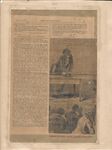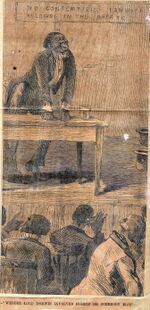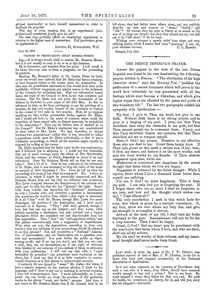HPB-SB-8-305: Difference between revisions
mNo edit summary |
mNo edit summary |
||
| Line 27: | Line 27: | ||
| author = Massey, C.C. | | author = Massey, C.C. | ||
| title = Visitors to Thirty-Eight Great Russel-Street | | title = Visitors to Thirty-Eight Great Russel-Street | ||
| subtitle = | | subtitle = | ||
| untitled = | | untitled = | ||
| source title = London Spiritualist | | source title = London Spiritualist | ||
Latest revision as of 07:09, 13 August 2024
 |
vol. title: Vol Four of The Theosophical Society of The Arya Samaj of Arya-wart vol. period: Sept 1878 – Sept 1879 pages in vol.: 350 |
< The Higher Uses of Mesmerism (continued from page 8-304) >
advised, (spiritually) to have himself mesmerised in order to facilitate his progress.
Will any of your readers, who is an experienced (nonprofessional) mesmerist, kindly give his aid?
The case may probably afford an interesting experiment in relation to the higher uses of mesmerism, Full particulars given on application to
July 15, 1879.
Visitors to Thirty-Eight Great Russel-Street
Sir,—It is always worth while to answer Mr. Stainton Moses, but it is not usually so easy to do so as in this instance.
He is discursive, and wanders from the point. I will recall it for those who may care to form a judgment on the proceeding in question.
Heading Mr. Bennett's letter to Dr. Carter Blake by itself, every one would have inferred that Dr. Blake had been a constant, or very frequent visitor to the rooms since his resignation. In that case, the prohibition addressed to him would have been quite justifiable, without supposing any special reason in the judgment of the Council, for excluding him. Had our information rested there, the reply of the Council to Mrs. Lowe was complete and obvious. But Dr. Blake had cut away the foundation of the defence by his letter in your paper of the 23rd May. In this he informed us that, so far from continuing to use the privilege of a member, he had only availed himself of the invitation to visitors to the extent of two calls in two months. Now, let us suppose anything we like, within permissible limits, against Dr. Blake, and I would ask how, in the name of common sense, could the repetition of these casual calls, at distant intervals, be prejudicial to the Association? How can we believe that it seemed so to the Council? But Dr. Blake’s statement was not contradicted in their letter to Mrs. Lowe. We had, therefore, to choose? between two suppositions—either that it was intended to inflict a gratuitous insult upon Dr. Blake individually, or that it was a vindictive proceeding, to which all the seceders might equally be exposed by calling at the rooms.
Dr. Blake assumed that the latter must be the true explanation, and I followed him in adopting it. I could not but remember that act of small revenge upon the editor of The Spiritualist, which, and the manner of which, disgusted so many of us into retirement. Does Mr. Stainton Moses tell us that we are mistaken? Not a bit of it. Does he say, contrary to the statement of Dr. Blake, that it was necessary to stop the visits of the latter on account of their frequency? No. Does he tell us what the proceeding did mean, if not what we supposed? No. I drew an inference, in which I might be personally concerned, and Mr. Stainton Moses does not say that my inference was erroneous. Mrs. Lowe resigned because she disapproved of the exercise of a right, and lie tells her that she has “ignored” the right. Somebody from outside has described the “National” Association as only a London club, and therefore a member is inconsistent who questions the motives from which a club right is exercised. It is all “they” with Mr. Moses, though Mrs. Lowe has never disparaged the position of the Association, and I have never imputed to it bigotry. “They” shift their ground, though I have had but one say on the subject; and Mrs. Lowe, while politely accepting a disclaimer, has only pointed out a logical alternative which she considers not less objectionable than her first supposition. Then “they” are “self-appointed critics,” and this phrase conventionally veils a suggestion of impertinence. Why, what are you, the Association, according to your own account, that any criticism of your proceedings should be objected to on that ground? You call yourselves a “National” Association of Spiritualists; and are Spiritualists not to question your acts and pretensions? You pose before the public as representing us all; and if we say you don’t, and that you are only a club, then are we inconsistent, as if our right of criticism were limited by our estimate of you, instead of being co-extensive with your professions. I will not say that only a “mind beclouded by prejudice” can perpetrate such reasoning as the above, but I must say that it is as little conducive to controversial clearness as is that phrase to controversial amenity.
I certainly did not intend to “assail” Mr. Calder (for whom I have a sincere respect) in the passing allusion I made to his language, and if there is any use or meaning in inverted commas, I have not misrepresented him. I wrote inferentially, as I supposed any one would see from the position of the quotation marks in the phrase “weak and feeble” persons. And does it not occur to Mr. Stainton Moses that if the Council wish to be left alone, they had better leave others alone, and not publicly describe our acts and reasons as “weak,” “feeble,” and “idle”? Of course, they are quite at liberty so to attack us (by way of inviting our return), but then they should not cry out and ask to be “left alone” if we hit back.
Wishing your columns a speedy relief from these not very edifying topics, which I cannot find even “amusing,” I am, sir, your obedient servant,
Temple, July 12th.

Editor's notes
Sources
-
London Spiritualist, No. 360, July 18, 1879, p. 29

